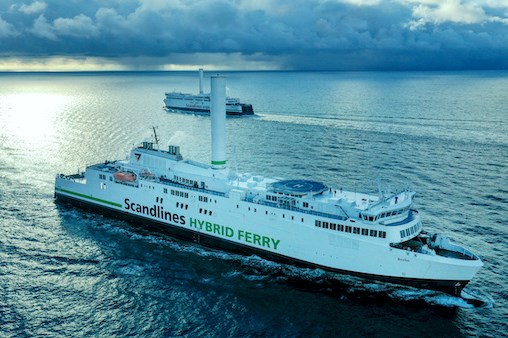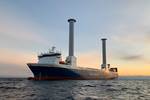Norsepower secures €28 million for modern mechanical rotor sail
New funding will accelerate composite rotor sail production, R&D, marketing, recruitment and more to expand the reach of Norsepower’s fuel-saving and emissions-reducing technology for ships.

Photo Credit: Norsepower
Norsepower (Helsinki, Finland), a global provider of composite mechanical sails for large ships, has successfully secured €28 million in its latest Series C fundraising round. French asset manager Mirova (Paris), an affiliate of Natixis Investment Management dedicated to sustainable investment, led the fundraising through its impact private equity Mirova Environment Acceleration Capital fund. Additional participants in the round included TheFinnish Climate Fund (Ilmastorahasto), OGCI Climate Investments, Nefco – The Nordic Green Bank, Tesi and Power Fund III. With a focus on impact, these organizations have joined forces to enable Norsepower to scale up production and expand the reach of its fuel-saving and emissions-reducing technology.
On a mission to decarbonize the shipping industry, Norsepower is committed to harnessing the power of the wind for large ships. According to the company, there are currently 30,000 vessels on the water today that can benefit from its Rotor Sails, which highlights the opportunity to reduce CO2 emissions across the global fleet by 80 megatons on an annual basis.
The Norsepower Rotor Sail is a modernized version of the Flettner rotor. It uses a minimal amount of the ship’s electric power to rotate cylinder-shaped rotors on the ship’s deck. Rotation, together with wind, generates powerful thrust — a ultimately saving fuel and reducing emissions. Norsepower says its product has already been used by customers for more eight years and has 250,000 operating hours of verified performance data acquired from highly regarded shipping companies and charterers. This performance data includes installations in collaboration with customers including Bore, Sea-Cargo, Scandlines, Vale, CLdN, Nippon Marine and Socatra, which have selected Norsepower Rotor Sails for improving fuel efficiency and reducing the emissions of their shipping operations.
The data — which shows fuel consumption savings of 5-25%, or more — has been measured and analyzed independently by Lloyd’s Register (London, U.K.), a provider of classification, compliance and consultancy services to the marine and offshore industries, as well as ABB, NAPA, Chalmers University of Technology and VTT.
Provided as a combination of equity financing and loans, the new funding will help accelerate Norsepower’s scale of production and help to meet increasing global demand. It will also strengthen Norsepower’s product research and development (R&D), marketing, recruitment and sizeable intellectual property portfolio.
“Our goal is simple — to cut the emissions of large ships by saving fuel with our proven Norsepower Rotor Sails,” Tuomas Riski, CEO of Norsepower, says. “We are going to bring a modern spin to wind propulsion technology. We empower the industry to use our product alongside other technologies to achieve zero-carbon, cost-effective sailing. With over 30,000 vessels globally that can benefit from our product, our scale-up ambitions are bold but realistic. It’s a win-win for everyone, including the planet.”
- Learn more about this modernized rotor sail technology.
- CW gives an overview of the boatbuilding and marine end market.
Related Content
-
Large-format 3D printing enables toolless, rapid production for AUVs
Dive Technologies started by 3D printing prototypes of its composite autonomous underwater vehicles, but AM became the solution for customizable, toolless production.
-
Refurbished Einstein yacht demonstrates innovative composites repair and redesign
Years of creative engineering work went into resurrecting the composites-intensive IMOCA 60 racing yacht — with award-winning results.
-
The lessons behind OceanGate
Carbon fiber composites faced much criticism in the wake of the OceanGate submersible accident. CW’s publisher Jeff Sloan explains that it’s not that simple.















